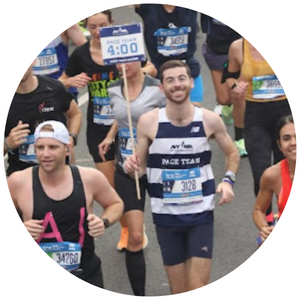Marathon Training in Your 30s, 40s, and Beyond: Adapting with Age

Age is no barrier. It’s a limitation you put on your mind.” – Jackie Joyner-Kersee
Marathon running is one of the most rewarding physical and mental challenges a person can undertake. But as we age, our bodies and training needs inevitably shift. Does that mean you need to hang up your running shoes in your 30s, 40s, or even 50s? Absolutely not. In fact, some of the most accomplished marathoners are well into their 40s and beyond. The key to success lies in understanding how your body changes with age and adapting your training plan to meet those changes.
At Run Adaptive, we create tailored marathon training plans designed to meet runners where they are in life. Whether you’re tackling your first marathon in your 30s or chasing a personal best in your 50s, here’s what you need to know to train smart and run strong.
How Training Changes with Age
Marathon training in your 20s often feels like an endless cycle of energy and rapid recovery. But as you enter your 30s, 40s, and beyond, your body starts to respond differently to high-intensity workouts and increased mileage. Here’s how age impacts training:
- Recovery Takes Longer: As you age, your body takes more time to repair and recover after intense workouts. This is due to reduced muscle elasticity, slower cell regeneration, and hormonal changes.
- Injury Risks Increase: Reduced bone density and joint flexibility mean older runners are more prone to overuse injuries like stress fractures, tendonitis, or knee pain.
- Endurance Over Speed: While raw speed may decline with age, endurance often remains strong, making marathon running an ideal sport for older athletes.
The key is to train smarter, not harder. With personalized run coaching from Run Adaptive, we help you adjust your intensity, mileage, and recovery strategies to match your body’s evolving needs.
Tips for Staying Injury-Free
No matter your age, injury prevention is crucial for marathon training success. But for runners in their 30s, 40s, and beyond, it’s even more important. Here are a few strategies to keep you running pain-free:
- Prioritize Strength Training
Incorporate strength workouts at least twice a week to build muscle stability and support joints. Focus on your core, glutes, and legs to improve running efficiency and reduce injury risk. - Listen to Your Body
Pay attention to early signs of fatigue, aches, or tightness. Rest days and recovery sessions are not optional—they’re essential for progress. - Stretch and Foam Roll
Make flexibility a priority. Dynamic stretches before runs and foam rolling afterward help maintain mobility and prevent stiffness. - Cross-Train
Include low-impact activities like swimming, cycling, or yoga to improve cardiovascular fitness without putting extra strain on your joints. - Get Fitted for Shoes
Proper footwear becomes even more critical as you age. A professional fitting can ensure you’re running in shoes that support your unique gait and foot shape.
Why Recovery is Key for Marathoners Over 30
As we age, recovery isn’t just about resting—it’s about actively helping your body rebuild. Marathon training recovery strategies become more complex and deliberate as the years go by. Here’s how to maximize your recovery:
- Sleep: Aim for at least 7-9 hours of quality sleep each night. This is when your body repairs muscles and replenishes energy stores.
- Nutrition: Eat a balanced diet rich in lean protein, complex carbs, and healthy fats. Post-run fueling with a combination of protein and carbs within 30 minutes of finishing can aid muscle repair.
- Hydration: Aging muscles lose water more quickly. Stay hydrated throughout the day and replenish electrolytes after long runs.
- Active Recovery: Light activities like walking, stretching, or gentle yoga can keep blood flowing and aid recovery without adding stress.
How Run Adaptive Tailors Marathon Plans for Your Age
At Run Adaptive, we understand that every runner is unique—and so are their training needs. For runners in their 30s, 40s, and beyond, our coaches take a personalized approach to:
- Adjusting Training Intensity: Ensuring you get the right balance of effort and recovery.
- Including Cross-Training: Building a stronger, injury-resistant body with activities beyond running.
- Incorporating Recovery Weeks: Scheduling lighter training weeks to prevent burnout and overtraining.
- Setting Realistic Goals: Whether it’s completing your first marathon or aiming for a personal best, we design plans that fit your goals and lifestyle.
With our data-driven coaching and real-time adjustments, you’ll stay on track to reach the starting line in peak condition—no matter your age.
Ready to Begin?
Marathon running is a lifelong journey, and age is just a number. At Run Adaptive, we’re here to help you adapt and thrive with personalized training plans tailored to your age and fitness level. Ready to crush your next marathon? Contact us today and let’s create a plan that works for you!








